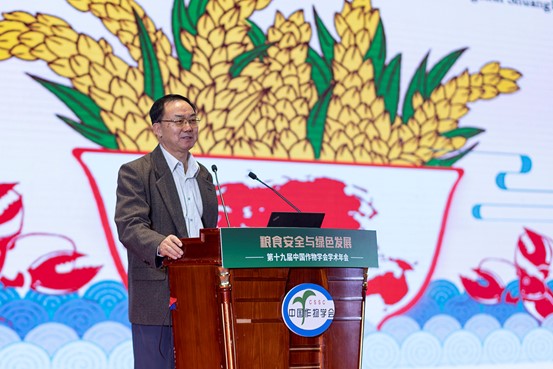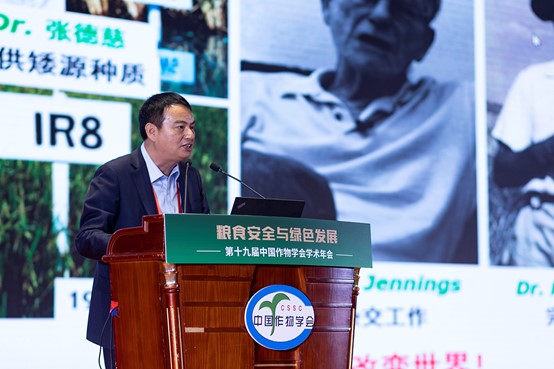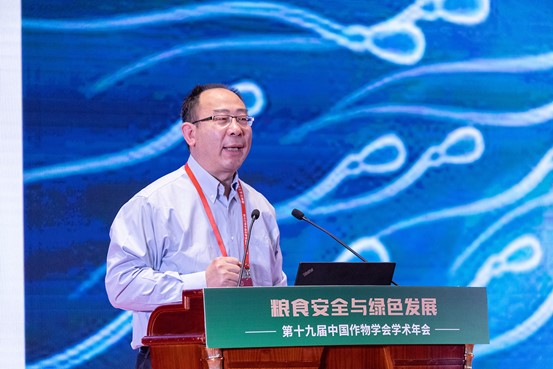
Zhang Qifa, academician of the Chinese Academy of Sciences, gave a report. (Photo by Wang Runchang)

Qian Qian, academician of the Chinese Academy of Sciences and vice president of the Crop Science Society of China, made a report. (Photo by Wang Runchang)

Yang Weicai, professor from the Institute of Genetics and Developmental Biology of CAS, gave a report. (Photo by Cai Luyang)
On the morning of Nov. 9, the 19th annual academic conference of the Crop Science Society of China was held in Eurasia Convention International Hotel in Wuhan, hosted by Zhang Hongcheng, academician of the CAE.
Zhang Qifa, academician of the Chinese Academy of Sciences gave a report on “The Cultivation of Rice in the New Era”, focusing on the topics: “from green super rice to green agriculture”, “the new breeding model” and “future prospect”. Zhang called for “the second green revolution”, highlighted the importance of green super rice and introduced the cultivation and production system of the new breeding model that was proposed in the process of promoting green super rice. He explained that the cultivation of rice in the new era was to improve the rice’s qualities through cutting production, promoting green agriculture, ensuring food safety, and improving its taste and nutrition, thus bringing up the value of rice.
Qian Qian, academician from the Chinese Academy of Sciences, reported on “Ensuring Food Security--Review and Prospect of Green Revolution”. In his report, he firstly reviewed the first green revolution which characterized by “a gene changed the world”. And then he introduced the application of allelic variations of semi-dwarf gene SD1 to rice breeding, the molecular editing breeding of gene SD1, the synergy of high-tillering dwarf gene HTD1 and semi-dwarf gene SD1 in details. He analyzed the molecular mechanism of high-tillering dwarf rice plants and elaborated on the wide use of advantageous allelic variations of strigolactones synthetic gene in the “green revolution”.
Yang Weicai, professor of the Institute of Genetics and Developmental Biology of CAS, introduced the research on the transferring mechanism of sperms of plants. Yang elaborated on the structure and function of female gametes, the special structure of three cells of male gametes, the guiding function of pollen tubes and also the function of related genes that influenced the guiding function of pollen tubes. Kong Lingrang, professor from Shandong Agricultural University, reported on “Horizontal Gene Transfer of Fhb7 from Fungus Underlies Fusarium Head Blight Resistance in Wheat”. In his report, he gave further introduction to the cloning and function of Fhb7 from following aspects: the genome sequencing and assembly of diploid thinopyrum elongatum, the fine mapping and cloning of head blight resistant gene Fhb7, and the horizontal gene transfer of Fhb7 from fungus to thinopyrum elongatum.
Tian Zhixi, professor from the Institute of Genetics and Developmental Biology, made a report on “Progress in Soybean Pan-Genome Research”, focusing on the important role of pan-genome played in soybean functional genome research and molecular breeding. Zhao Ming, professor from the Institute of Crop Sciences, Chinese Academy of Agricultural Sciences, reported on “The Establishment and Application of High-yield and High-efficient System of Quantitative Optimization of Corn Resources”, introducing the development of crop cultivation qualitative to quantitative perspective and proposing establishment of an integrated technical model.
The lectures given by the invited experts at the opening ceremony focused on the theme of “food security and green development”, concerning forefront issues of crop science. From the afternoon of Nov. 9 to the morning of Nov. 10, academic exchanges would center on the four topics: crop gene mining and molecular breeding, crop germplasm resources and genetic improvement, green high-yield and high-efficient cultivation and rural revitalization, and crop information and smart agriculture.
Source: http://news.hzau.edu.cn/2020/1110/58720.shtml
Translated by: He Dan
Supervised by: Wang Xiaoyan
